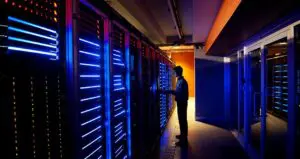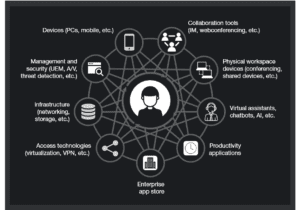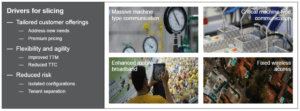Twitter Feed
SourceConnecte! Marketplace With A Mission
Earlier this year, GC GlobalNet launched a new breed of B2B e-commerce sites. Curated by Kevin L. Jackson, SourceConnecte (with an “eâ€) went live with three strategic goals in mind: Efficiently leverage modern…
Potential vs. Reality: Is Edge Computing Real?
Edge computing provides compute, storage, and networking resources close to devices generating traffic. Its benefits are based on an ability to provide new services capable of meeting stringent operational requirements…
Enabling Digital Transformation
Digital transformation integrates technology into all areas of an organization’s business or mission. Its fundamental purpose is to create and deliver innovative and industry-changing products and services to a global…
The ThinkShield Story Part 1: The Challenge
The cybersecurity challenge seems to be growing daily. Threats are becoming more sophisticated, and attacks are becoming more destructive while the corporate world’s response seems to resemble a deer…
CIO dream team: Who’s in and why?
Today’s CIO navigates the twin challenges of enabling new business models and managing rapid technological change. Cloud computing strategies are now table stakes. CIOs must make complex decisions about using…
Digital Transformation and the Mainframe
Digital transformation infuses digital technology into all areas of an organization’s business or mission. Its fundamental purpose is to create and deliver innovative and industry-changing digital products and services to…
Composable Architecture Q&A. Are you ready?
Q: Is it time for my company to jump on the composable architecture bandwagon? A: Composable architectures are quickly becoming essential to the modern enterprise. Citing a recent Forrester study:…
Increase Productivity by Reducing Technology Distraction: Lessons from Forrester Research
Workplace productivity is hurt every day by the very technology developed and purchased to improve it. Forrester announced this surprising conclusion in their latest “How To Wake Up From The Nightmare…
Unveiling the end-to-end capabilities for the networked society
An Interview with Henrik Basilier By Kevin L. Jackson The telecom industry is rapidly moving towards a future in which networks must have the capabilities of delivering services with the…
AT&T Finance Solutions GM on Shrimping, Software, and CX
Helping clients address the trends and challenges presented by the Financial Services industry is the main focus for René Dufrene in his role as General Manager of Finance Solutions at…
Communications Service Providers (CSPs) are facing significant business model challenges. Referred to generally as edge computing, the possibilities introduced by the blending of 5G networks and distributed cloud computing technologies are redefining how CSPs operate, partner, and drive revenue. A new Ericsson Digital whitepaper entitled, “Edge computing and deployment strategies for communication service providers,†addresses these challenges by providing much-needed insight and actionable strategic recommendations.
Written by Ericsson Director Cloud Strategy Execution Carlos Bravo and Solution Marketing Manager Henrik Bäckström, this new work presents a practical roadmap for how the industry should address the expected US$700 billion in 5G-enabled, business-to-business value. It directly answers the question of how operators can maintain relevance in the face of the current massive industry changes. The most enlightening aspect of the paper was the architectural approach to the design and deployment of advanced edge computing solutions. The four critical components of this approach are:
- Dynamic orchestration and management;
- Application runtime execution environment;
- Connectivity; and
- Distributed cloud infrastructure.
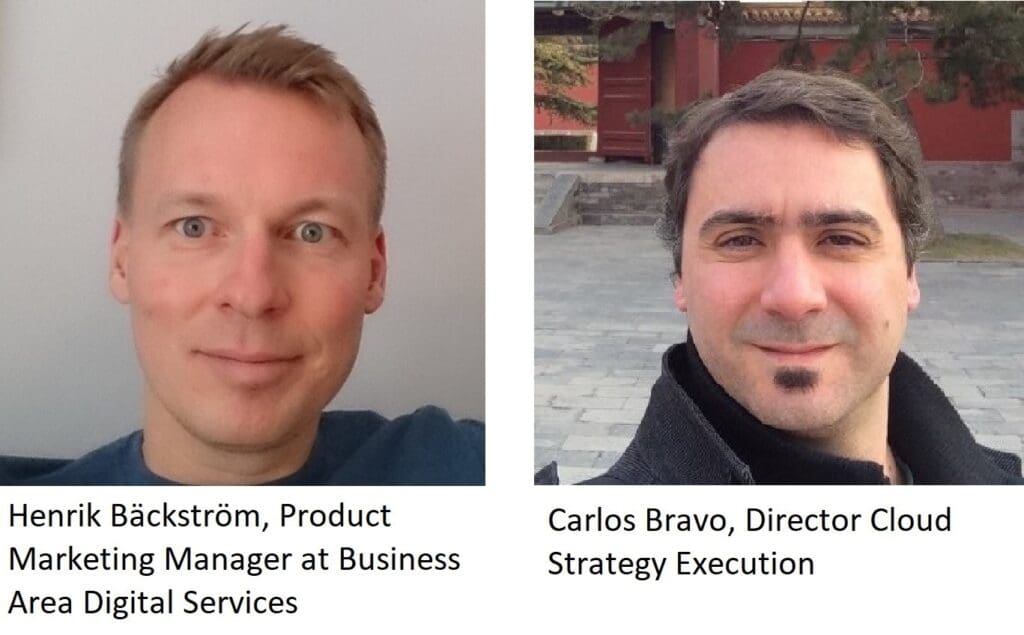
Dynamic orchestration and management emphasize a centralized function that maintains awareness of the network topology and resource availability. This capability maintains consistency between user plane gateway functionality and edge applications.  Consistency is critical to the management of non-telco workloads and VNFs. The application runtime execution environment (RTE) is responsible for hosting all enterprise customer applications in a consistent and well-documented edge computing service environment. Documentation is essential to the development and nurturing of the CSP’s application developer community. Connectivity delivers foundational bandwidth, throughput, mobility, and latency requirements. For edge computing, the application developer may specify these requirements. New traffic routing services that coordinate application server requirements and network functionality are also required. In combination, these capabilities enable the Distributed Cloud Infrastructure, which is composed of global, national, regional, and local cloud data centers. The integration of these data centers with the network is also critical.
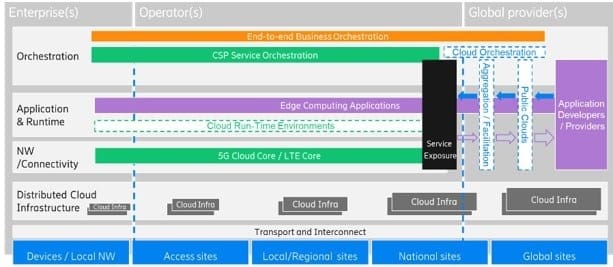
Success with this model requires an overall strategy that differentiates on services delivered. This strategy differs from the more common “services description†approach by its ability to solve industry-specific challenges through the provisioning of easy-to-consume application programming interfaces, or APIs. This “broad tent†approach also requires open collaboration with system integrators, hyperscale cloud service providers, and operations technology vendors. System Integrators (SI) are particularly suited to the task of addressing enterprise pain points related to edge computing solution implementation and the integration of vertical industry offerings. Hyperscale Cloud Providers (HCP) deliver cloud infrastructure and platforms. They also bring with them the application developer ecosystems. Operations Technology (OT) vendors have the Internet of Things (IoT) platforms and applications that deliver the real value at the network edge. Since differentiated services must also be easily accessible to application developers, operators should offer APIs that follow industry de-facto standards or adopt APIs that present a common list of attributes.

This business model approach redefines the telecommunications value chain. It features operators as the provider of new enterprise-focused offerings. The models also enable many and varied use cases across multiple industry verticals. Operators can also differentiate locally while simultaneously leveraging a global edge computing ecosystem.
Following this recommended path leads typically to service provider focus on one, or a combination, of the following high-level strategies:
- Full Edge Provider – CSP advances a strong go-to-market (GTM) relationship with the enterprise or the application developer/provider, committing to vertical-specific SLAs
- Partner Edge Provider – CSP resells HCP and OT vendor industry vertical solutions delivered over the provider’s connectivity services. The focus is on use cases that depend on robust connectivity.
- Aggregator Edge Provider – CSP partners with a content aggregator through a revenue share aaS model. The aggregator commits to SLAs while the CSP provides edge hardware.
- Limited Edge Provider – CSP focusses on connectivity that supports vertical industry solutions offered by partner HCP, SI and OT vendors
Edge Computing is drastically changing the service provider role. Success will depend on pursuing a collaborative partner strategy that highlights your telco company’s strengths. All of the recommended strategies, however, demand an understanding and focus on enterprise vertical challenges and solutions.
Ericsson Digital Services offer solutions to modernize, digitalize, and shape new business models for Telco operators globally. Our advanced offerings are designed to help you secure, serve, and grow your business and customer base through innovative customer engagement platforms, automated operations, and programmable networks. If you know what your customers are doing, you will know what to do for your customers. Let us help you leverage edge computing to transform your business so you can evolve, scale and thrive in the digital era. Please visit https://www.ericsson.com/en/digital-services/trending/edge-computing.
Disclaimer: This article was sponsored by Ericsson as part of the Ericsson Ambassador Program.
Cloud Computing
- CPUcoin Expands CPU/GPU Power Sharing with Cudo Ventures Enterprise Network Partnership
- CPUcoin Expands CPU/GPU Power Sharing with Cudo Ventures Enterprise Network Partnership
- Route1 Announces Q2 2019 Financial Results
- CPUcoin Expands CPU/GPU Power Sharing with Cudo Ventures Enterprise Network Partnership
- ChannelAdvisor to Present at the D.A. Davidson 18th Annual Technology Conference
Cybersecurity
- Route1 Announces Q2 2019 Financial Results
- FIRST US BANCSHARES, INC. DECLARES CASH DIVIDEND
- Business Continuity Management Planning Solution Market is Expected to Grow ~ US$ 1.6 Bn by the end of 2029 - PMR
- Atos delivers Quantum-Learning-as-a-Service to Xofia to enable artificial intelligence solutions
- New Ares IoT Botnet discovered on Android OS based Set-Top Boxes







